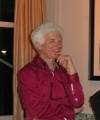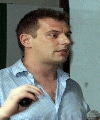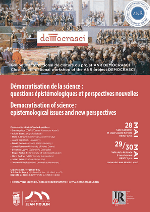Université de Lyon, France May 28-30, 2018
Description: The two-and-half-day international workshop is the closing event of the DEMOCRASCI project, which deals with the epistemological foundations and principles for the democratisation of the governance of science (for more details on the DEMOCRASCI project, see the project presentation page).
Topics include but are by no means limited to: arguments underlying advocacy of the autonomy of science; soundness of the demarcation between basic and applied research; scientific knowledge as a common good and public-interest driven research; public participation in science; socially responsible science; practical forms of democratic governance of science; role of scientific experts in the governance of science, etc.
Call for papers: closed
View/Download the programme and practical information
Participants who will not give a talk are welcome and are asked to register by emailing Stéphanie Ruphy (stephanie.ruphy@univ-lyon3.fr) and Baptiste Bedessem (baptiste.bedessemp@gmail.com) in advance. There is no registration fee.
View the videos of the interventions
Invited speakers:

Sara Aguiton (CNRS/Centre Alexandre Koyré) – “The politics of Technical Democracy. Social sciences, protest movements and technoscientific powers in the transformations of public participation in France” – View/Download Abstract

Cécile Blatrix (AgroParisTech) – “Twenty years of citizen conferences in France. What assessment can be made?” – View/Download Abstract

Mark B. Brown (California State University) – “Expertise, Populism, and White Identity Politics” – View/Download Abstract

Jaana Eigi (Tartu University) – “Objectivity, participation, democracy: bringing together Helen Longino’s ideas about objectivity and analyses of democratic participatory practices” View/Download Abstract

David Guston (Arizona State University) – “Frankenstein and Democracy” – View/Download Abstract

Janet Kourany (University of Notre Dame) – “Bacon’s promise” – View/Download Abstract

Séverine Louvel (SciencePo Grenoble) – “Do funding agencies foster the convergence of the epistemic commitments of scientists? Insights from interdisciplinary nanomedicine in France and in the United States” – View/Download Abstract

Roger Pielke Jr. (University of Colorado Boulder) – “Scientific Authority and Political Myth” – View/Download Abstract

Hans Radder (VU University Amsterdam) – “Which scientific knowledge is a common good?” – View/Download Abstract

Julian Reiss (Durham University) – “Fact-Value Entanglement and Other Reasons for the Dearth of Uncontroversial Social Scientific Knowledge” – View/Download Abstract

Torsten Wilholt (Leibniz Universität Hannover) – “What Is a University, and Do We Need It?” – View/Download Abstract
Other speakers:
Teresa Yolande Branch-Smith (University of Waterloo) – “The Value-Free Ideal in Science Communication” – View/Download Abstract
Léo Coutellec (Université Paris-Sud) – “Epistemological characteristics of the implicated science. Issues for the research on Alzheimer’s disease” – View/Download Abstract
Stéphanie Debray (Université de Lorraine) – “Academic Consensus, Interface Consensus, and Decision-making procedures: When should we consider citizen discourse in scientific deliberation?” – View/Download Abstract
Caglar Dede (Erasmus University Rotterdam) – “Well-Ordered Nudges” – View/Download Abstract
Renaud Fine (Université Grenoble Alpes) – “Ordinary citizens vs stakeholders: Which ‘public’ should participate in well-ordered science?” – View/Download Abstract
Evaldas Juozelis (Mykolas Romeris University Vilnius) – “Legitimacy of Science Autonomy: Three Options, Two Ontologies, One Perspective” – View/Download Abstract
Inkeri Koskinen (University of Helsinki) – “Epistemic success and societal impact in extra-academic collaboration” – View/Download Abstract
Hugh Lacey (Swarthmore College) – “Democracy and methodological pluralism” – View/Download Abstract
Alain-Marc Rieu (Université Jean Moulin Lyon 3) – “Science and democracy: the missing nexus” – View/Download Abstract
Laura Rodriguez (Institut des sciences de l’évolution, Montpellier) – “Scientific ecology in environmental impact assessment: tensions between scientific imperative and deliberative imperative” View/Download Abstract
Haris Shekeris (Université Jean Moulin Lyon 3) – CIVISTI and the ideal conversation: a comparison of two modes of setting the research agenda – View/Download Abstract
Jorrit Smit (Leiden University) – “Utility as epistemology: a pragmatist take on science policy” – View/Download Abstract
Organizers: Stéphanie Ruphy (Université de Lyon) and Baptiste Bedessem (Université Grenoble Alpes)


